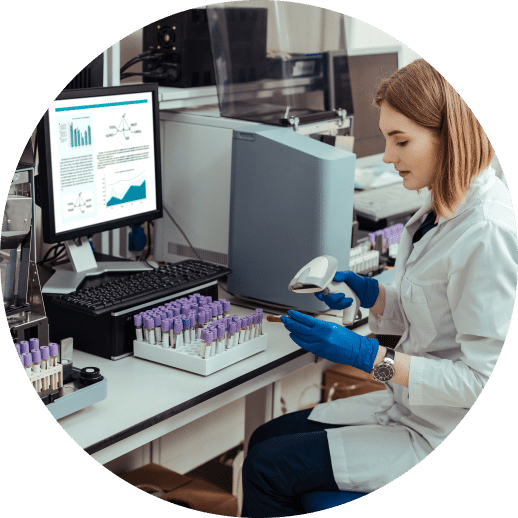Curated Collections
Explore our themed educational resources and build your knowledge of genomics in healthcare

Showcase of Genomics across North Thames
On 14 July 2022 the North Thames Genomic Medicine Service (GMS) held an event showcasing how genomic medicine is transforming healthcare in our region. Here you can watch recordings of some of the day’s talks and hear how the North Thames GMS is delivering new genomic tests and redesigning pathways to bring the benefits of genomics to patients across North London, Essex, and Hertfordshire.
On 14 July 2022 the North Thames Genomic Medicine Service (GMS) held an event showcasing how genomic medicine is transforming healthcare in our region.
In this presentation, Professor Dame Sue Hill DBE, Chief Scientific Officer for England, opened the showcase by setting out some of the history of genomic medicine, the groundwork that laid the way for the Genomic Medicine Service, and outlining some of the current work of the GMS.
On 14 July 2022 the North Thames Genomic Medicine Service (GMS) held an event showcasing how genomic medicine is transforming healthcare in our region.
In this presentation,Dr Francesca Faravelli, Clinical Director of North Thames GMS Alliance, and Professor Rachel Butler MBE, Chief Operating Officer of North Thames Genomic Laboratory Hub, discuss the next steps for the North Thames GMSA and GLH.
On 14 July 2022 the North Thames Genomic Medicine Service (GMS) held an event showcasing how genomic medicine is transforming healthcare in our region.
Around 1 in 1000 children develop early onset epilepsy, and 50% of cases are believed to have a genetic cause. Determining this genetic cause can have a major impact on treatment considerations. In this talk Professor Helen Cross, The Prince of Wales’s Chair of Childhood Epilepsy and Head of the Developmental Neuroscience Research and Teaching Department at UCL-Great Ormond Street Institute of Child Health, provides an overview of the ongoing GeneSTEPS study – Shortening Time to Evaluation in Paediatric Epilepsy Services – which aims to determine genetic answers for early onset epilepsy.
On 14 July 2022 the North Thames Genomic Medicine Service (GMS) held an event showcasing how genomic medicine is transforming healthcare in our region.
Global developmental delay (DD) and Intellectual Disability affect 2%–3% of the worldwide population, however historical investigation techniques for developmental delay in children have had low diagnostic yields.
Genetic testing provides a significantly higher diagnostic yield than previous techniques and is helping to provide diagnoses for these children, supporting their management and clinical decisions related to their care.
In this talk, Dr Elaine Clark, a Consultant Paediatrician at Great Ormond Street Hospital for Children, discusses the work of North Thames GMSA in bringing genomics into community paediatrics to help in clinical management of conditions and support accurate genetic counselling.
On 14 July 2022 the North Thames Genomic Medicine Service (GMS) held an event showcasing how genomic medicine is transforming healthcare in our region.
Lynch Syndrome is an inherited condition caused by an inherited DNA repair pathway defect which results in an increased risk of colorectal, endometrial, and other cancers. 1 in 400 people in the UK are affected by Lynch syndrome, but only an estimated 5% of those people have been diagnosed.
Dr Kevin Monahan, Consultant Gastroenterologist at the Lynch Syndrome Clinic, St Mark’s Hospital, is the lead for NHS England’s National Lynch Syndrome Project. In this presentation he introduces the project and its aims to increase diagnoses of Lynch syndrome in patients with colorectal or endometrial cancer.
On 14 July 2022 the North Thames Genomic Medicine Service (GMS) held an event showcasing how genomic medicine is transforming healthcare in our region.
Clare Turnbull is a Clinical Consultant in Cancer Genetics and a Professor of Translational Cancer Genetics in the Division of Genetics and Epidemiology at the Institute of Cancer Research. In this talk she explains the BRCA-DIRECT study taking place at The Royal Marsden Hospital, which is investigating how digital pathways can be used to expand capacity and deliver rapid, diagnostic genetic testing in women with breast cancer.
On 14 July 2022 the North Thames Genomic Medicine Service (GMS) held an event showcasing how genomic medicine is transforming healthcare in our region.
In the UK 15-20% of kidney failure cases are caused by monogenic disease. A genetic diagnosis can explain the reason for a person’s illness, inform transplant decisions, and can guide treatment decisions. In this talk Professor Daniel Gale, St Peter’s Chair of Nephrology at University College London, explains how whole genome sequencing is helping patients with cystic kidney disease.
On 14 July 2022 the North Thames Genomic Medicine Service (GMS) held an event showcasing how genomic medicine is transforming healthcare in our region.
Dr Jack Bartram is a Consultant Paediatric Haematologist at Great Ormond Street Hospital for Children. In this talk he explains the benefits of whole genome sequencing in paediatric haematology and how consolidating panel testing is enabling delivery of a new standard for care for diagnostics in paediatric blood cancers.
On 14 July 2022 the North Thames Genomic Medicine Service (GMS) held an event showcasing how genomic medicine is transforming healthcare in our region.
Mike Hubank, Scientific Director at North Thames GLH and Head of Clinical Genomics (Research) at The Royal Marsden NHS Foundation Trust, explains how solid tumour diagnosis through large gene panel testing is helping to improve genetic and genomic diagnosis of cancer.
On 14 July 2022 the North Thames Genomic Medicine Service (GMS) held an event showcasing how genomic medicine is transforming healthcare in our region.
In this talk Dharmisha Chauhan, Lead Genomic Pharmacist at North Thames GMSA, introduces what pharmacogenomics is, explains some of the genes that are known to affect drug metabolism, and discusses current projects in pharmacogenomics as well as looking ahead to future projects both regionally and nationally.